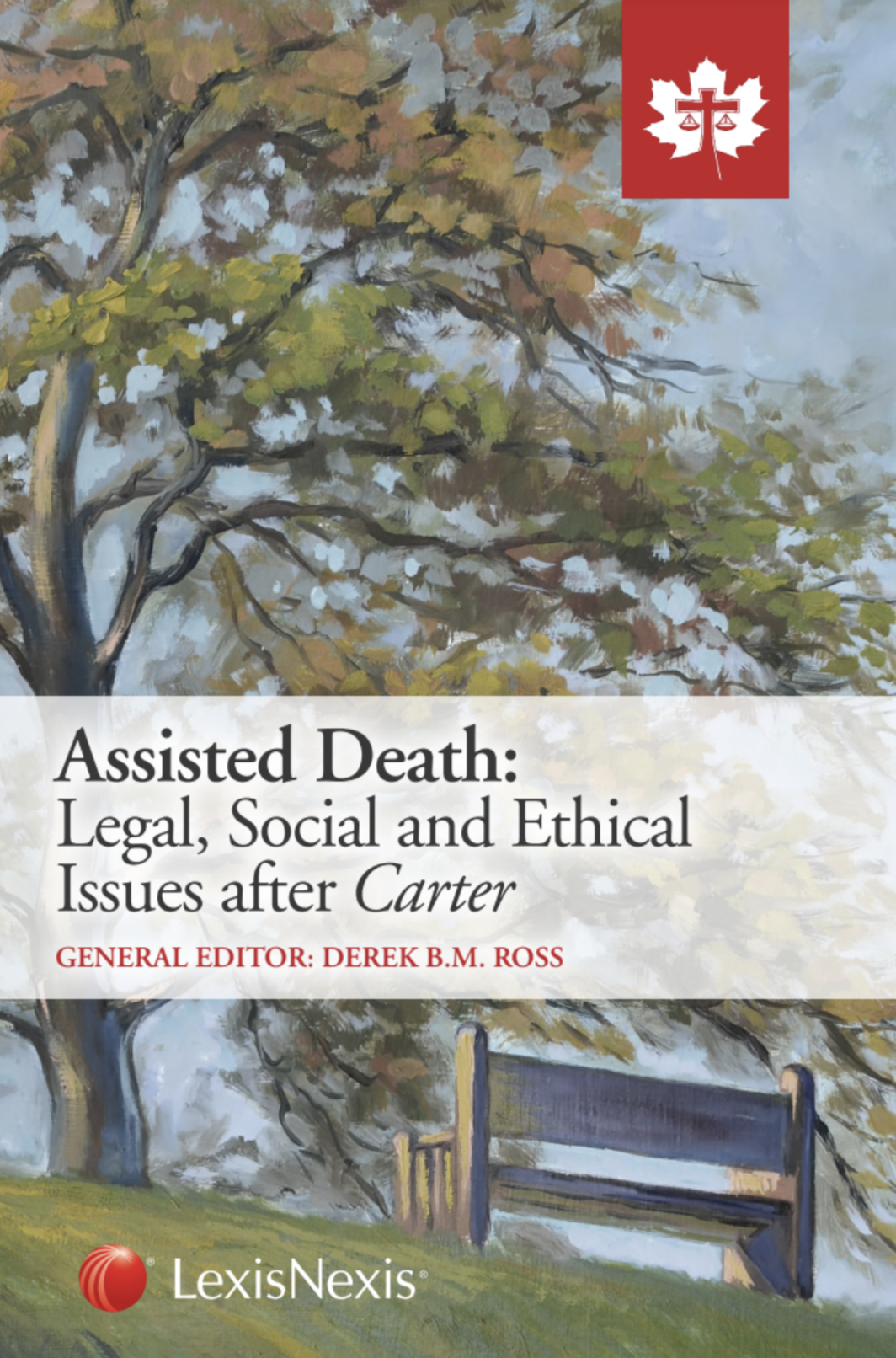New book from LexisNexis Canada features 13 articles from leading academics and practitioners examining the social, ethical and legal implications of the Carter decision.
“The issues in this litigation are both complex and momentous. They affect life and death, and the quality of life of people who are ill and dying. The resolution of these issues - indeed, whatever the outcome on final appeal - will affect many people and will also have an impact on the development of fundamental principles of Canadian law.”
“Virtually every decision of the Supreme Court of Canada will have a significant impact on Canadian law. But some judgments will have an impact so profound and resonate so widely as to be considered legally and even culturally transformative. In my view, Carter v. Canada is one such decision.”
Christian Legal Fellowship is very pleased to announce the publication of a new book edited by CLF's Derek B.M. Ross: Assisted Death: Legal, Social and Ethical Issues after Carter
The collection originates from a Symposium on the Supreme Court’s decisions in Carter v. Canada hosted by Christian Legal Fellowship and sponsored by LexisNexis Canada in September 2017. The Symposium was attended by delegates from across Canada representing numerous law faculties and professional disciplines, including law, medicine, social work, and dietetics.
Physician-assisted dying, or “medical assistance in dying” (MAiD), as it is now known, was decriminalized in certain circumstances as a result of the Supreme Court of Canada’s 2015 decision in Carter v. Canada (Attorney General) and implemented through Bill C-14 in 2016. This timely collection of 13 papers—developed out of CLF's 2017 Academic Symposium featuring leading experts and on constitutional, health, and human rights law—examines the social, ethical and legal implications of the Carter I and Carter II decisions and offers meaningful reflections to the many perplexing questions currently being asked about MAiD.
As issues surrounding law, health, religion, and conscience continue to intersect, it is our hope that this text will provide a thoughtful resource. As Derek Ross explains in the preface to the book:
“Our national discussion about assisted dying must not end simply because a law has been passed. We must continue to work toward solutions to better serve people who are ill, elderly, or disabled. We must continuously ask whether we are doing all we can to help reduce barriers, and ameliorate suffering and loneliness. We have let our fellow Canadians down if they reach the point where, because we have not supported them with the care and companionship they need, they feel their only solution is to end their lives.
I’m confident that we can continue such a conversation, regardless of our respective views on MAiD, about how to help improve the lives of those in need of support. My hope for this volume is that it might meaningfully contribute to that important discussion. ”
Read the Introduction to the book.
The collection originates from a Symposium on the Supreme Court’s decisions in Carter v. Canada hosted by Christian Legal Fellowship and sponsored by LexisNexis Canada in September 2017. The Symposium was attended by delegates from across Canada representing numerous law faculties and professional disciplines, including law, medicine, social work, and dietetics.
What's Inside:
PART I: CARTER'S IMPACT ON CANADIAN LEGAL DOCTRINE
Carter: A Stain on Canadian Jurisprudence?
Dr. John KeownCarter and the Unsettling of Stare Decisis
Prof. Dwight NewmanThe "Basic Bedford Rule" and Substantive Review of Criminal Law Prohibitions Under Section 7 of the Charter
John Sikkema
PART II: CHARTER IMPLICATIONS FOR HEALTH CARE PROFESSIONALS AND INSTITUTIONS
Conscientious Objections to Medical Aid in Dying: Considering How to Manage Claims of Conscience in a Pluralistic Society
Prof. Mary Anne Waldron, Q.C.The Call in Carter to Interpret Freedom of Conscience
Brian BirdAutonomy, Complicity, and Conscience: Charter Implications of the ‘Duty to Refer' for Physician-Assisted Suicide
Derek B.M. RossThe Right of Religious Hospitals to Refuse Physician-assisted Suicide
Barry W. Bussey
PART III: THE FUTURE OF PALLIATIVE CARE IN CANADA AND SAFEGUARDS MOVING FORWARD
Endgame: Philosophical, Clinical and Legal Distinctions Between Palliative Care and Termination of Life
Prof. Mary J. Shariff & Mark GingerichEstablishing the Right to Palliative Care in Canada
David Baker & Geoff CrossThe Way Forward for Medical Aid in Dying: Protecting Deliberative Autonomy is Not Enough
Prof. Jonas-Sébastien Beaudry
PART IV: CHARTER DIALOGUE AND THE CONSTITUTIONALITY OF CANADA'S MAID LEGISLATION
Dialogue on Death: Parliament and the Courts on Medically-Assisted Dying
Dr. Thomas M.J. Bateman & Matthew LeBlancConstitutional Aspects of Canada's New Medically-Assisted Dying Law
Prof. Hamish StewartCharter Scrutiny of Canada's MAiD Law and the Shifting Belgian and Dutch Euthanasia Landscape
Prof. Trudo Lemmens
Save the date for CLF's annual Symposium (September 27, 2018; Vancouver, BC). CLF intends to produce a similar publication after the 2018 Symposium.



